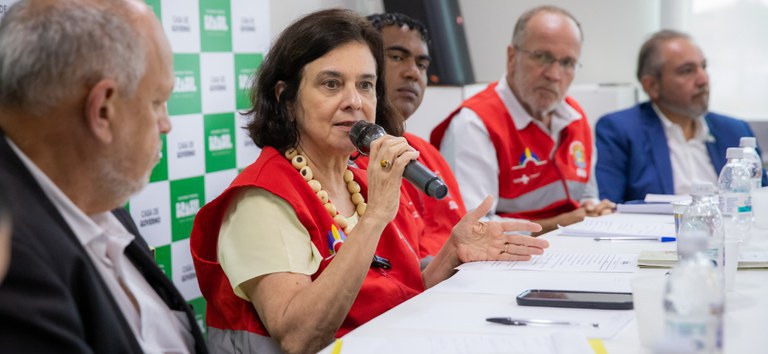Notícias
BOA VISTA
"We are definitely in a new cycle," says Brazil's Minister of Health about progress in Yanomami territory

Brazil's Minister of Health, Nísia Trindade, highlighted the progress of assistance in the territory and celebrated the reopening of seven base centers - Credit: Rafael Nascimento/MS
Brazil's Minister of Health, Nísia Trindade, assured that assistance in Yanomami territory is going through a new phase, with more services and care measures available for the Indigenous population. The statement was made on Tuesday morning (13), in Boa Vista, where she is conducting her work agenda.
The minister underlined that investing in Indigenous people's health is a priority for the Ministry of Health and for President Luiz Inácio Lula da Silva. "We have made a huge effort to get rid of illegal mining, improve health indicators, and strengthen care measures for the indigenous population. We are definitely in a new cycle. We know how this crisis affects the reality of the Yanomami people. We are committed to resolving the issues," she emphasized.
Nísia Trindade also highlighted the advances in assistance in the territory. Among the most significant actions, she pointed out the reopening of seven base centers. In all, 5,200 Indigenous persons have regained access to health services.
"All 37 health centers are now open. There was a very significant number of Indigenous persons unassisted, and we changed this under our administration. We are also working to strengthen Indigenous health management," she stressed.
"It really is a very important phase for us. An additional 400 professionals will be incorporated in Indigenous health here. Together with other ministries, we are going to work on social restructuring. It is a very challenging time, but we are making progress. Dialogue with society and indigenous leaders is essential," concluded Trindade.
STRENGTHENING MANAGEMENT - The Secretary of Indigenous Health, Weibe Tapeba, called for the strengthening of Indigenous health management in his state of Roraima, which was seriously affected between 2019 and 2022.
"We have been working to restructure the management of the base centers, the Yanomami Special Indigenous Health District (Dsei), and the Yanomami Indigenous Health Support House (Casai) in Boa Vista. The experience in the Yanomami territory has taught us a lot about improving the national Indigenous health policy," he concluded. Weibe Tapeba has signaled that investments in health infrastructure in the region will continue to be reinforced. The most recent announcement is the hiring of 15 specialist doctors. "By the end of the year, there will be 80 doctors in the territory. Today, there are 37. When we took office there were only four," he stressed.

REPORT - The minister's visit to Boa Vista comes days after the Ministry of Health released a new report from the Yanomami Emergency Operations Committee (Comitê de Operações Emergenciais /COE). In the first quarter of this year, 74 deaths were reported in the territory. Compared to the same period last year, there was a 33% drop. In the first three months of 2023, 111 deaths were recorded. The document shows a decrease in the occurrence of the main health problems, such as malaria, malnutrition, and severe acute respiratory infections.
The Yanomami people have the largest Indigeneous land in Brazil, with 10 million hectares, more than 380 communities and 30,000 people. Since January 2023, the Ministry of Health has been investing to mitigate the serious crisis caused in the region by illegal mining. The ministry has increased the number of professionals, doubled investment in health actions, and worked to ensure assistance and to combat diseases such as malaria and malnutrition in the territory.
Otávio Augusto
Ministry of Health